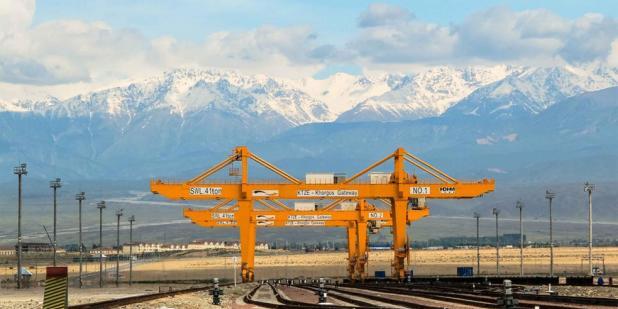One of the BRI key projects: The Khorgos Gateway in Kasakhstan | Photo credit: Khorgos Gateway
Xi Jinping began talking about China’s Belt and Road Initiative in Kazakhstan in 2013, but China’s government began encouraging firms to “go out” in the late 1990s. More than 100 countries and nearly 30 international organizations have signed Belt and Road memoranda of understanding with the Chinese government to cooperate with Beijing on facilitating connectivity and trade and fostering people to people exchanges. Countries in Africa and Latin America have signed on to participate. For this workshop we’ll focus on the Belt and Road Initiative in Southeast and Central Asia. The initiative has sought to bind China to its neighbors through physical infrastructure and telecommunications and to foster trade and investment. China’s leaders want to develop the country’s border regions and to create conditions for continued economic advance.
Of course, trade networks between China and the rest of Eurasia have a long history. These networks have been so important that in 1988 UNESCO launched its Silk Roads Programme. Many states mandate that secondary school social studies and history courses introduce the idea of the cultural and economic impact of Silk Road exchanges. We looked at how various peoples across Asia have responded to the initiative and at the varied impact the initiative has had on region’s economies, environments and cultures.
Videos are also available on our YouTube channel.
Presenters:
David Lampton, Johns Hopkins University
"Rivers of Iron: Railroads and Chinese Power in Southeast Asia"
Prof. Lampton is co-author of Rivers of Iron: Railroads and Chinese Power in Southeast Asia (2020), which looks the strengths and weaknesses of the BRI in design and implementation. It explores how politics within eight Southeast Asian nations help shape what gets built and how it impacts relations with Beijing. The book draws on fieldwork in China and throughout Southeast Asia to examine the role of infrastructure in strengthening Chinese influence and in advancing the development aims of individual Southeast Asian nations.
Jessica C. Liao, North Carolina State University
"BRI Infrastructure Projects and the Environment"
Prof. Liao is the author of Developmental States and Business Activism: East Asia’s Trade Dispute Settlement (2015) and a number of articles on environmental issues associated with Chinese energy and mining projects in Southeast Asia. She’s carried out research in Malaysia and elsewhere in Southeast Asia and has also written on Chinese and Japanese high-speed rail building in the region. Two of her most recent articles look at financing for coal-fired power plants and management at energy and mining projects in Southeast Asia.
Dru Gladney, Pomona College
"BRI and Central Asia: Xinjiang - Bridge or Barrier?"
Prof. Gladney has published a number of books and articles on Muslims in China (including the award winning Muslim Chinese: Ethnic Nationalism in the People’s Republic). His current work explores the links and experience of Hui, Uyghur and Kazakh families in China, Central Asia and Europe. He looks at globalization and transnationalism in Eurasia, including the key role Beijing envisions for Xinjiang.
Funding for the discussion came from the Freeman Foundation to the National Consortium for Teaching about Asia (NCTA) and the Institute for International Business-CIBER at the University of Colorado, Denver. Co-sponsored by the Association of Asian Studies Committee for Teaching about Asia.




